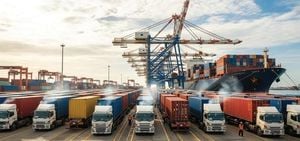India's Budget 2025, revealed by Finance Minister Nirmala Sitharaman on February 1, 2025, is poised to redefine the country’s logistics and economic framework, embracing transformative reforms aimed at enhancing infrastructure and promoting growth.
The budget is particularly focused on the logistics sector, which is receiving much-needed investment to modernize infrastructure, streamline regulatory processes, and bolster India's competitive edge on the global stage. Industry leaders and policymakers express optimism about the incoming measures, with many awaiting the strategic initiatives poised to shape the future of logistics and air cargo.
Rizwan Soomar, the Chief Executive Officer and Managing Director of DP World Middle East, North Africa, and India Subcontinent, articulated the significance of these reforms, stating, "Investments in logistics infrastructure have a direct impact on the growth of trade." He emphasized the need for increased capital expenditure focused on creating multimodal transport ecosystems as integral to enhancing India's global connectivity.
Central to the logistics transformation is the advent of multimodal transport, which integrates rail, road, air, and sea freight. The government's commitment to accelerating the operationalisation of dedicated rail freight corridors (DFCs) aims to significantly improve cargo movement to and from Indian ports and industrial centres. According to Soomar, "Railways are the backbone of India’s logistics ecosystem. We look forward to dedicated rail freight corridors becoming fully operational to scale movement to and from ports and to connect production and consumption centres more effectively." This infrastructure overhaul is seen as pivotal for accommodating the growing demands of trade.
Digitalisation is another focal point of Budget 2025, as the logistics industry faces a rapid transformation fueled by technology. The government plans to reinforce its commitment to paperless trade, real-time cargo tracking, and data-driven supply chain optimization. Soomar noted, "Further digitalisation and automation of freight operations could be prioritized to improve efficiency and reduce the cost of logistics." Integrative technologies like Artificial Intelligence, blockchain, and Internet of Things stand at the forefront of this revolution, promising to streamline operations at ports, warehouses, and transport terminals.
Sustainability has cemented its place within the logistics discourse, aligning with global green trends. The upcoming budget proposes to incentivize cleaner transportation and energy-efficient operations, with Soomar emphasizing, "Sustainability is a vitally underlying aspect of the infrastructure and logistics sectors." Initiatives may include tax benefits for electric vehicle (EV) adoption within logistics hubs and investments aimed at reducing carbon footprints across the system.
On the insurance front, the government’s policy shifts extend to increasing foreign direct investment (FDI) limits to 100%, marking the most significant reform to the insurance sector. This move is anticipated to attract substantial foreign capital and encourage competition among insurance providers, which could lead to more favorable price points for consumers. This proactive approach to reform mirrors the vision set forth for India's economic health overall, with expectations for the insurance market to thrive over the next two decades.
Notably, the government plans to extend health insurance provisions to gig economy workers under the PM Jan Arogya Yojana, addressing the glaring gaps within India's health coverage by potentially benefiting millions currently uninsured. The need for greater health insurance penetration has become more pressing, evidenced by alarming statistics indicating nearly one-third of the population without any form of coverage—an unsustainable scenario for the nation’s future.
The bottom line of Budget 2025 reflects the view held by many experts: By not only addressing infrastructural inadequacies within logistics but also emphasizing inclusivity and sustainable practices, this budget may catalyze India’s pursuit of becoming a $5 trillion economy. The reforms proposed are not simply about economic quantification, but also embody the ambition to reshape livelihoods and bolster communities across the country.
Conclusively, Budget 2025 stands as a clarion call for India's logistics transformation, setting the stage for improved efficiency, sustainability, and job creation. Industry leaders await concrete commitments, but the signs indicate a collective endeavor toward progress, innovation, and fostering global competitiveness for India.



